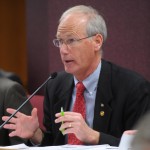
JEFFERSON CITY, Mo. – SB 820, sponsored by Sen. Kurt Schaefer, R-Columbia, was voted out of the Senate Appropriations Committee on Tuesday. The bill, identical to four preceding it, seeks to close the legal loophole that excludes companies who did not participate in the 1998 Master Settlement Agreement (MSA) from making escrow deposits from tobacco sales. The bill has an emergency clause in response to the April 15 deadline set by the lawsuit. Inaction will cause the state to lose close to a billion dollars in revenue over the next decade.
Ron Leone, Missouri Petroleum Marketers and Convenience Store Association Executive Director said, “The similar bills filed in the past have not succeeded because the Missouri legislature and Missourians think it is a bad idea, which was shown in 2012 with Prop B.”
Proposition B, which sought to increase cigarette sales taxes in 2012, failed by 40,419 votes – a margin of 1.6 points.
“Big Tobacco is using Senator Kurt Schaefer to tinker with the free market and to reduce the competitiveness that Little Tobacco currently has. [SB820] would reduce the competitive advantage that Little Tobacco has over Big Tobacco by creating a 355% tax increase on Little Tobacco only. Cartons of Little Tobacco value brand cigarettes would go up by $6 or more per carton,” said Leone.
Fair Trade Missouri has led the effort to close the loophole. Anne Marie Moy, Fair Trade Missouri spokesperson, is happy with the bill’s progress.
“Today’s 7-3 vote is an important step toward closing the Allocable Share Release loophole,” Moy said. ” This year alone, Missouri is being forced to give back $71 million to tobacco companies. Failure by the Missouri Legislature to close this loophole has created an artificial subsidy that favors some tobacco manufacturers over others and may result in continued loss, as much as $1 billion over 10 years.”
Surveys were conducted of likely voting Missourians by Fabrizio, Lee & Associates in late February. The poll was released in the Capitol the week before spring break in a memorandum from Fair Trade Missouri. The memo highlights results that show voters supportive of equal treatment for all tobacco companies by a 2/3 majority. Given more information about the specific situation, about 61 percent of survey participants became supportive of closing the loophole.
The survey went on to measure the political nature of legislative inaction on the loophole and found that over half “would be willing to vote for someone new” consistently across party demographics.

When Leone learned of the poll he said, “That poll is nonsense. It has no credibility because the Missouri voters spoke loud and clear on the issue when they defeated Prop B in 2012.”
Supporters of the initiative say that this loophole favors Little Tobacco companies that were not included in the lawsuit settlement, which originally included Big Tobacco companies such as R.J Reynolds and Phillip Morris Inc. SB820 requires all tobacco companies to either participate in the terms of the MSA or deposit just over a penny for every unit sold within the state.
For the past year, Missouri will surrender $69 million of the expected $130 million put into the escrow account by tobacco companies.
Representative Rick Stream, R-Kirkwood, said, “This is an incredibly complicated issue, not that the budget is nearly out of the House, we will have more time to devote to other pieces of legislation. I am going to continue to monitor the bill’s progress in the Senate, gather information, and work with my committee to get this issue resolved.”
“This money could have been used for schools, roads, health care or any of the other needs of the people of this state,” Moy said.
Missouri is the only state that has failed to close the loophole. The state’s collection rate is the lowest of all of the 46 MSA-participating states.
Rachael Herndon was the editor at The Missouri Times and also produced This Week in Missouri Politics, published Missouri Times Magazine, and co-hosted the #MoLeg podcast. She joined The Missouri Times in 2014, returning to political reporting after working as a campaign and legislative staffer.
Rachael studied at the University of Missouri – Columbia. She lives in Jefferson City with her husband, Brandon, and their two children.





